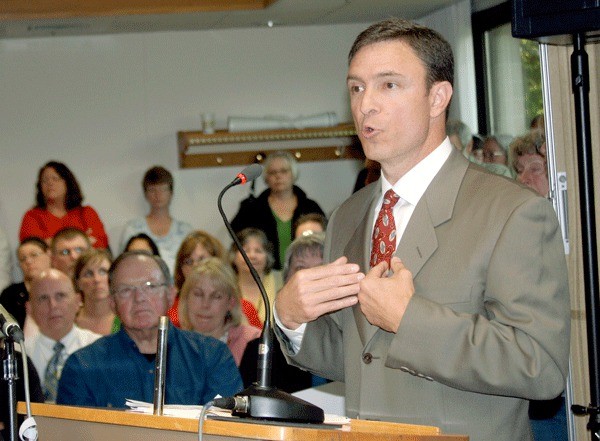Well, at least they wore nice suits.
Despite being dressed for success, leaders from Capella Healthcare didn’t have much to celebrate Monday night as the Whidbey General Hospital board of commissioners unanimously rejected a proposal to sell the hospital to the for-profit company.
More than 100 skeptical people crammed into the hospital’s conference room and poured out into the hallway to hear the proposal from Capella Healthcare, a company based in Tennessee. The company owns 11 hospitals across the country.
Board members and the audience were clearly upset at the timing of Capella’s proposal. The presentation came about a week before mail-in voting wraps up May 17 for a $50 million bond that would fund construction of a new wing at the 41-year-old hospital’s Coupeville campus. Bond supporters worried that the presentation would sabotage the chances of the bond passing.
“I really resent this. I think you’re taking advantage of us,” board member Ron Wallin said during the meeting. Even though Capella officials said they don’t have any position on the hospital bond, Wallin said he found it hard to believe they didn’t research the hospital’s current situation.
He also questioned how committed the company would be to Whidbey General. He argued that re-selling the hospital is where Capella would make its money.
“You could sell us out to Walmart,” Wallin said.
Former hospital CEO Bob Zylstra also spoke about the timing of Capella’s presentation.
“It has disrupted and undermined the bond issue,” Zylstra said.
His concerns were echoed by Linda Morris of Langley.
“People are upset and confused about what to do about the bond,” Morris said. Once it became apparent that the commissioners weren’t supporting Capella’s proposal, she held up ballots, which were in favor of the bond, that she was going to drop in the mail.
Questions arose about why hospital commissioners decided to hear Capella’s presentation so close to the election deadline.
Commissioner Anne Tarrant said the hospital received a request from Capella to make a presentation during a board meeting and it was decided Capella should present its proposal Monday in the interest of transparency.
Richard Charbonneau, vice president of business development for Capella Healthcare, apologized about the timing of the presentation and reiterated that the company was not trying to influence the election.
In an interview after the Capella presentation, Charbonneau said Capella would still be interested in Whidbey General Hospital regardless of the election results. If the bond passes, however, he said there is concern covenants could be written into the bond documents preventing the debt from being paid off early. Capella couldn’t acquire Whidbey General Hospital because a for-profit company is prohibited from owning tax-exempt bonds.
Three leaders from Capella Healthcare were at the hospital board of commissioners meeting to point out the advantages the company could provide Whidbey General Hospital.
Charbonneau pushed the fact the company could make capital improvements to the hospital campus, save the hospital millions of dollars because of the company’s purchasing power with vendors and suppliers, and expand services while maintaining staff and seniority levels. He also noted that, as a for-profit venture, the hospital would start paying taxes, which he said would provide millions of dollars for local jurisdictions.
They also highlighted the charity care they provide at Capella’s hospitals and claimed that money made would be reinvested into the Coupeville facility.
Board member Dr. Paul Zaveruha questioned how the company would financially benefit from Whidbey General Hospital.
“Somewhere in the pipe, you have a dollar going from here to Capella,” Zaveruha said.
Andy Slusser, senior vice president for acquisitions and development for Capella Healthcare, said the hospital’s value would increase as it grows and expands. As for money going to Capella, he said the company would take 1.8 percent of revenues as a management fee.
Slusser said Capella Healthcare started in 2005. A private equity firm based in Chicago, GTCR, invested $220 million in Capella and has another $180 million available. Over the past three years, Capella has acquired nine hospitals. The company specializes in owning hospitals in smaller communities.
Charbonneau said there could be several different ways for Capella to be involved with the hospital. The company could lease the facility from the hospital district, purchase it, or operate it as a joint venture with 50-50 ownership.
Capella officials realized, with the bond election so close, that there wasn’t any visible support for their proposal at Monday’s meeting.
“If you don’t want to partner with us, you have the right to say no,” said Erik Swensson, chief medical officer for Capella.
Company officials acknowledged their timing was bad. With the presentation coming so close to the election, Swensson said, “I think we’re walking into a bee’s nest.”
Tarrant polled the board members and all five said they would vote against any proposal to work with Capella. The board opted against taking a formal vote because Capella didn’t bring forward a specific proposal.
Hospital CEO Tom Tomasino said he was somewhat surprised to hear that Capella’s proposal caused confusion with voters. He told the Whidbey News-Times in a recent interview that if the $50 million bond for a new 39-bed wing fails badly at the polls, the board may have to look at other options.
Tomasino said Monday he is still receiving inquiries from private companies eyeing Whidbey General. LifePoint Hospitals, for example, recently sent an email expressing interest, but it hasn’t made a request to present to the board.
Capella officials said they respect the commissioners’ decision, but left the door open if the hospital administration wishes to consider working with the company in the future.
“We’d be more than willing to entertain discussions,” Slusser said.



